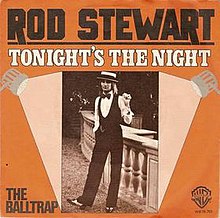Tonight's the Night (Gonna Be Alright)
| "Tonight's the Night (Gonna Be Alright)" | ||||
|---|---|---|---|---|
 |
||||
| Single by Rod Stewart | ||||
| from the album A Night on the Town | ||||
| B-side | "The Ball Trap" (UK) "Fool for You" (US) |
|||
| Released | May 1976 (International) September 1976 (US) |
|||
| Format | 7" single | |||
| Recorded | December 1975 | |||
| Genre | Soft rock | |||
| Length | 3:56 (album version) 3:34 (edit) |
|||
| Label | Riva | |||
| Writer(s) | Rod Stewart | |||
| Producer(s) | Tom Dowd | |||
| Rod Stewart singles chronology | ||||
|
||||
"Tonight's the Night (Gonna Be Alright)" is a song by Rod Stewart, recorded at Muscle Shoals Sound Studio in Sheffield, Alabama for his 1976 album A Night on the Town. The song became his second US chart topper on the Billboard Hot 100, peaked at No. 5 in the UK, No. 3 in Australia and charted well in other parts of the world as well. It was the number 1 song on Billboard's 1977 year-end chart. It became the best-selling single of 1977 in the United States.
According to Dan Peek of America, Stewart's inspiration for "Tonight's the Night" was America's Top 30 hit "Today's the Day": Peek recalls that one evening when he and his guest Rod Stewart were playing together in Peek's home recording studio: "I played 'Today's the Day', the song I had been working on. Rod said that he liked it and that it gave him an idea for a song. Of course after his recording of 'Tonight's the Night' came out I laughed when I remembered what he'd said. I'm sure I probably smacked my forehead and said: 'Why didn't I think of that?'"
The song features a French spoken part from Britt Ekland who was Stewart's girlfriend at the time. While primarily recorded at Muscle Shoals, the final vocal was recorded at Caribou Ranch studios, where Stewart, Ekland and producer Tom Dowd spent several days. Some radio stations play edits of the song, shortening the coda, as well as the whispers, because they were deemed to be too suggestive for airplay, where the songs could be banned from being played on the air.
The singer is addressing a girl (whom he calls "my virgin child"), encouraging her to do various acts that one normally associates with preparing for sex, such as drawing the blinds, removing her shoes, and the like. One particular line is a relatively blatant double entendre referring to sex:
...
Wikipedia
